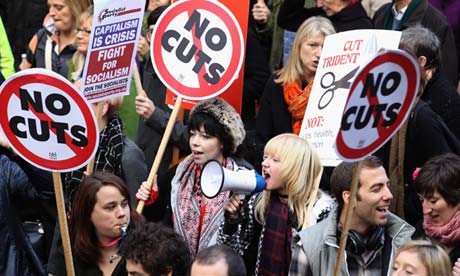Unions open up new front in confrontation with government following last year's pensions dispute

The Trades Union Congress has backed co-ordinated strike action by public sector workers over pay and opened up a new front in the industrial confrontation with the government after last year's pensions dispute.
The move came as the two largest teaching unions in England and Wales – the NUT and NASUWT, which represent more than 600,000 teachers – announced an indefinite work-to-rule protest from 26 September. The campaign means teachers will refuse to supervise pupils during lunch breaks and will stop providing cover for colleagues.
The teaching unions' announcement was followed by a motion at theTUC's annual conference in Brighton calling on the labour movement's umbrella organisation to support co-ordinated walkouts in protest at a multi-year pay freeze.
The motion states that the TUC will give "full support to all groups of workers in the private or public sector who take industrial action against cuts or attacks on pay, jobs, pensions or conditions of service and co-ordinating unions taking strike action".
The motion was proposed by Britain's largest public sector union, Unison, which has formed an alliance with the GMB union that could lead to nearly 1.5 million employees in the health and local government sectors staging walkouts next spring if negotiations over pay break down.
Dave Prentis, the Unison general secretary, said: "If employers refuse to negotiate, if the attacks continue, we will move to the co-ordinated action, which is called for in this composite. Now is the time for action."
The Unison motion was backed by other major figures in the union movement. Len McCluskey, the general secretary of Unite, urged trade unionists to follow the 20 October Future That Works march and rally with a campaign of "civil disobedience and strike action".
The largest civil service union, the Public and Commercial Services (PCS) union, called for strikes as soon as possible after 20 October, earlier than the spring action Unison and the GMB are considering. Mark Serwotka, the PCS general secretary, said: "We need a sense of urgency to turn the words in this resolution into action before it's too late." Public sector pay has replaced pension reform as the primary issue for Unison. A three-year pay freeze will be followed by two years of further restraint after the chancellor, George Osborne, capped pay increases in 2013-14 and 2014-15 at 1%, effectively tying the hands of local government employers and the NHS pay review body. With that restriction in place, some delegates at Brighton were describing strike votes in the spring as being almost inevitable.
David Cameron's official spokesman said strikes would not benefit anyone at a time when the country needed unity.
"Obviously we think that strike action benefits no one. At the present time, our economy faces significant challenges. What we need is for the country to come together to deal with these challenges."
The spokesman said the government would not relax restraints on public sector pay. "We have put in place a freeze on public sector pay for two years. We don't intend to reopen that decision."
Asked if the government planned to introduce legislation limiting the right to strike, the spokesman said: "We have got no plans to change the law in this area."
The TUC for the first time also backed a motion calling for full nationalisation of the banking sector. A statement by the TUC's general council argued that a publicly owned banking service would be "democratically and accountably managed" and would play a "central role in building a sustainable economy".
However, the TUC general secretary, Brendan Barber, said converting the government's stakes in Lloyds Banking Group and Royal Bank of Scotland (RBS) into 100% shareholdings should not be seen as a panacea.
The banking union, Accord, raised concerns over the financial costs of such a move, calling it "a utopian position that is never likely to be delivered".
The motion was heard 24 hours before Ed Balls is due to address the TUC. The shadow chancellor is resisting calls for the complete nationalisation of RBS, the majority stake in which is owned by the state, but he does back the formation of a public investment bank. He faces tough questioning over his support in January for public sector pay restraint, a position that drew sharp rebukes from Unison, Unite and the GMB.
Belum ada komentar untuk "TUC backs public sector strikes over pay"
Post a Comment